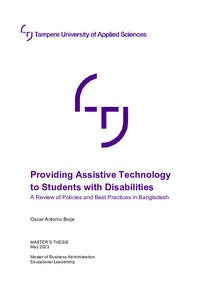Providing assistive technology to students with disabilities : a review of policies and best practices in Bangladesh
Boije, Oscar Antonio (2023)
Boije, Oscar Antonio
2023
All rights reserved. This publication is copyrighted. You may download, display and print it for Your own personal use. Commercial use is prohibited.
Julkaisun pysyvä osoite on
https://urn.fi/URN:NBN:fi:amk-2023061624056
https://urn.fi/URN:NBN:fi:amk-2023061624056
Tiivistelmä
Children with disabilities in Bangladesh face significant obstacles in terms of accessing and participating in primary education to the same extent as their peers, including due to a lack of access to assistive technology. This has led to the group being significantly over-represented among out-of-school children. In addition, those children that do participate in education struggle to acquire foundational literacy and numeracy skills and risk dropping out of school.
The thesis seeks to contribute to the Bangladesh Directorate of Primary Education’s and UNICEF’s planned pilot to enhance the provision of assistive technology to students with disabilities through the primary education system. Through a review of secondary data (academic literature, national legislation and policies, international treaties, thematic frameworks, and project reports), the thesis identifies how authorities in Bangladesh and other countries are presently providing assistive technology to children with disabilities, as well as how such efforts compare to globally established best practices developed by United Nations agencies and other international stakeholders.
Following a review of present policies and practices in Bangladesh, in particular the Policy on the Provision of Assistive Devices, and comparing them with global best practices, the thesis makes 15 recommendations aimed at enhancing further the present assistive technology provision process through primary schools in Bangladesh. The recommendations relate to Adjusting the Used Terminology; Engaging Teachers; Providing Additional Capacity Building Opportunities; Reaching the Children in Most Need of Support; Enhancing the AT Provision Cycle; Evaluating the Present DPE Process; and Reaching Out-of-School Children. Most importantly, education authorities in Bangladesh are recommended to adjust their current policies and practices to ensure the provision of assistive technology is treated as a holistic, long-term service.
Adopting the proposed recommendations, education authorities and other stakeholders in Bangladesh could enhance their inclusive education practices, consequently also ensuring more children with disabilities are able to access and participate in education.
The thesis seeks to contribute to the Bangladesh Directorate of Primary Education’s and UNICEF’s planned pilot to enhance the provision of assistive technology to students with disabilities through the primary education system. Through a review of secondary data (academic literature, national legislation and policies, international treaties, thematic frameworks, and project reports), the thesis identifies how authorities in Bangladesh and other countries are presently providing assistive technology to children with disabilities, as well as how such efforts compare to globally established best practices developed by United Nations agencies and other international stakeholders.
Following a review of present policies and practices in Bangladesh, in particular the Policy on the Provision of Assistive Devices, and comparing them with global best practices, the thesis makes 15 recommendations aimed at enhancing further the present assistive technology provision process through primary schools in Bangladesh. The recommendations relate to Adjusting the Used Terminology; Engaging Teachers; Providing Additional Capacity Building Opportunities; Reaching the Children in Most Need of Support; Enhancing the AT Provision Cycle; Evaluating the Present DPE Process; and Reaching Out-of-School Children. Most importantly, education authorities in Bangladesh are recommended to adjust their current policies and practices to ensure the provision of assistive technology is treated as a holistic, long-term service.
Adopting the proposed recommendations, education authorities and other stakeholders in Bangladesh could enhance their inclusive education practices, consequently also ensuring more children with disabilities are able to access and participate in education.
